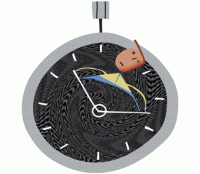Student Research: The Right Information at the Right Time
Google puts a universe of information at the end of any Internet connection.
This is both true and unhelpful. It offers up the universe, but no one needs the universe -- they need the right information, and they need it at the right time.
A fact. A concept. An image. A resource. Maybe a new perspective.
And finding the right information at the right time can be as challenging as finding just the right word for a poem or the right song for an occasion. Research is often conducted in short bursts when there is library or computer lab time scheduled, often at the beginning of a project, or in the middle when ideas run dry.
This is curious.
In an always-on learning environment, constant access should be leveraged. This doesn't mean that learners should always be online, but rather they should always have that access.
Searching for Information
While other ways of finding information exist (e.g., bing), and new ones are surfacing (Quora), by far the most popular is the noun that has become a verb: Google.
"Googling" the lyrics from a song, a retailer's reputation or the author of a text is often the fastest way to find information. In fact, I'll often back out of a website to Google something I'm looking for rather than use that site's built-in search mechanics and navigation.
If you can learn the art of the keyword search, along with a handful of other Google tricks and tips, you can usually find what you need, or at least where to look next. But the whole "universe at your fingertips" is unhelpful in this sense: what you'll actually find when you look is strangely limited.
The way Google retrieves information encourages web content creators to use SEO techniques. SEO stands for Search Engine Optimization. It's not necessarily as nefarious as it sounds, since it's easy to imagine a world where only the very best information and ideas are found. Value is subjective, and in the real world it's traffic, not knowledge, that drives the decision-making about what "content" is.
With such a crushing amount of information out there, even Google has to wave the white flag and ask for some help in finding information via massive servers, bots, spiders and even their social media platform Google+. Some content designers have learned how to get their content discovered, while others have not.
This presents a challenge.
The Timing of Information
In learning, as with boxing, dancing, selling and clock-making, timing is everything:
- The right question at the right time
- The right assessment at the right time
- The right information at the right time
When and how students reach out for information often changes the nature of the information they're reaching out for. Are they asking broad, sweeping questions that survey macro-level themes? Minor, detail-oriented questions that represent "lower-level" information?
Google struggles with the former dreadfully. I recall teaching a unit on the definition of humanity a few years ago and cringing -- even audibly groaning -- to see students on Yahoo Wiki Answers querying, "What are the sources of humanity?"
This is a classic case of user error, but Google encourages it by issuing you 27,674,767 search results for even the most outlandish term.
Signal to Noise
There is no single way to make sure that students have the proverbial right tool (information) at the right time. Some of this is teacher instinct; some of it is a matter of serendipity.
But the juxtaposition between overwhelming information sources and the critical nature of information timing can cause some teachers to pare down data sources for the students, or to improve the quality of research results by adding their own sources. "These three websites, these two books, these four essays."
Reducing "information noise" for students is near the top of the list of responsibilities for the 21st century teacher.
But teaching students to do this for themselves -- so that they have a far greater likelihood of finding the right information at the right time -- just might be responsibility number one.
